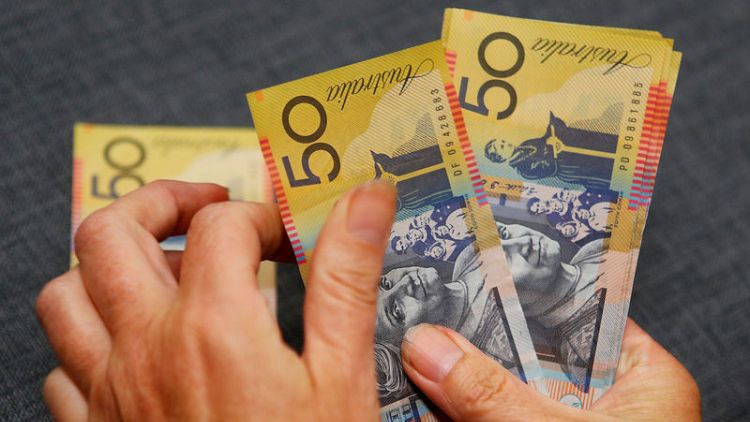By Shinichi Saoshiro
TOKYO (Reuters) - The Australian dollar shot to a two-month peak on Wednesday after data showed steady Chinese economic growth in the first quarter, helping Australia's currency shake off earlier losses.
The Aussie was 0.2 percent higher at $0.7190 after touching $0.7206, its strongest since Feb. 21. It also reached a four-month peak of 80.71 yen.
The currency is sensitive to the economic fortunes of China, Australia's biggest trading partner.
China's economy grew 6.4 percent in the first quarter from a year earlier, official data showed on Wednesday, above expectations, helped by sharply higher factory production.
"Short positions for the Aussie had piled up just yesterday on the dovish RBA, and now they appear to be reversed in haste following the Chinese data," said Yukio Ishizuki, senior forex strategist at Daiwa Securities.
The Australian dollar has been dogged recently by the Reserve Bank of Australia's dovish stance.
On Tuesday, the Aussie took a brief hit after the RBA said it believes a cut in interest rates would be "appropriate" should inflation stay low and unemployment trend higher.
Ishizuki said "while the RBA has sounded dovish, actually cutting rates is not a realistic option at the moment. This, in addition to higher iron ore prices, could propel the Aussie higher in the long term."
The U.S. dollar, often a safe haven, sagged against the euro after the Chinese data eased concerns about a global economic slowdown.
The dollar index against a basket of six major currencies dipped 0.1 percent to 96.976.
The euro rose 0.2 percent to $1.1300, paring the previous day's losses.
The single currency came under pressure on Tuesday after Reuters quoted four sources with direct knowledge of discussions as saying several European Central Bank policymakers think the ECB's economic projections are too optimistic, as economic weakness in China and trade tensions lingers.
The New Zealand dollar was down 0.5 percent at $0.6727 but the Aussie's bounce helped it pull back from a 3-1/2-month low of $0.6668 plumbed earlier in the session.
The kiwi was hit after data showed New Zealand's annual inflation slowed in the first quarter, which raised the odds of an interest rate cut in the coming months.
The greenback was flat at 111.98 yen after briefly popping up to 112.17 yen, its highest since Dec. 20, following a bounce in U.S. yields to four-week highs.
Graphic: World FX rates in 2019 http://tmsnrt.rs/2egbfVh
(Editing by Jacqueline Wong and Richard Borsuk)



